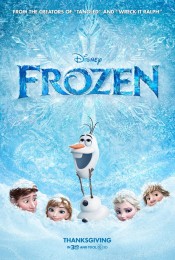‘Frozen’ fails to hit warm emotional temperature
In the pantheon of animated movies, “Frozen” isn’t a bad offering. But ranged alongside Disney’s other achievements — “Tangled,” “The Princess and the Frog,” “The Lion King” and “Mulan” — it deeply disappoints.
“Frozen” is an adaptation of the Hans Christian Andersen fairy tale “The Snow Queen.” It tells the story of two princesses in the northern land of Arendelle. The elder princess, Elsa, can conjure ice and snow with a wave of her hand, an ability that she initially uses to create wintry wonderlands where she and her younger sister, Anna, play — until Elsa loses control and injures Anna. Anna’s memories of Elsa’s magic are erased, and Elsa retreats into seclusion, terrified of her ever-growing powers. Then the princesses’ parents die, and on the day of Elsa’s coronation, the palace is finally opened, allowing the stifled Anna to seek true love. However, when an argument reveals her powers, Elsa flees, accidentally bringing down winter in the middle of Arendelle’s summer. Leaving the handsome and charming Prince Hans in charge, Anna leaves to search for her sister and end the unnatural winter, meeting up along the way with the solitary ice delivery man Kristoff and the naive, adorable snowman Olaf.
Disney’s best known for its musicals, and “Frozen” tries very hard to join that group, but something went wrong in the planning process. Early on, “Frozen” hammers viewers with no fewer than five songs in quick succession, then leaves them with only one more number for the entire remainder of the film. With the exception of the spectacular “Let It Go,” none of the songs are memorable or particularly moving, though there is some entertainment value in listening to Olaf the snowman sing about how he wants to do “whatever snowmen do in summer.” In fact, all the songs have a slick, overdone quality; they seem to be produced more in the pop-music, radio-friendly tradition of Disney Channel’s child stars than in the emotional style of Disney’s other movies.
The characters in “Frozen” are likable, but their development is somewhat lacking. Olaf’s cutesy tomfoolery could have been a trainwreck, but he actually ends up improbably charming. Even Kristoff’s extremely amateur ventriloquism doesn’t come off too obnoxious; Anna is sweet and believably awkward; and Sven, Kristoff’s trusty reindeer, can join “Tangled’s” Maximus and Achilles from “The Hunchback of Notre Dame” as one of Disney’s wonderfully lovable steeds. However, “Frozen” does its most interesting character, Elsa, a great disservice by ignoring her emotional growth. Elsa’s story of isolation and restrictive conformity could have been used to explore the conflict between love and fear through the symbolic medium of cold’s dual nature as beautiful snow and deadly ice. But this would have taken effort and risk, so instead Elsa is pushed to the back-burner and the story focuses on her perkier, easier-to-like sister, leaving viewers with only a glimpse of the complexity and power that could have been part of “Frozen.”
“Frozen’s” plot isn’t strictly linear, but its twist seems obligatory and forced. It’s more as if the writers realized that they couldn’t have a story this predictable than if they actually liked their story. And despite this effort, it’s still very predictable, hitting the requisite clichés of betrayal and devotion. “Frozen” does little to dispel cynicism about its end message, “Love conquers all.”
Though its animation is gorgeous, especially when Elsa exhibits her powers, all in all “Frozen” deserves to be shelved. It might be a fun watch for kids or second-screen addicts who aren’t paying much attention anyway, but joining Disney’s other works as a masterpiece for all ages? Hardly.













































